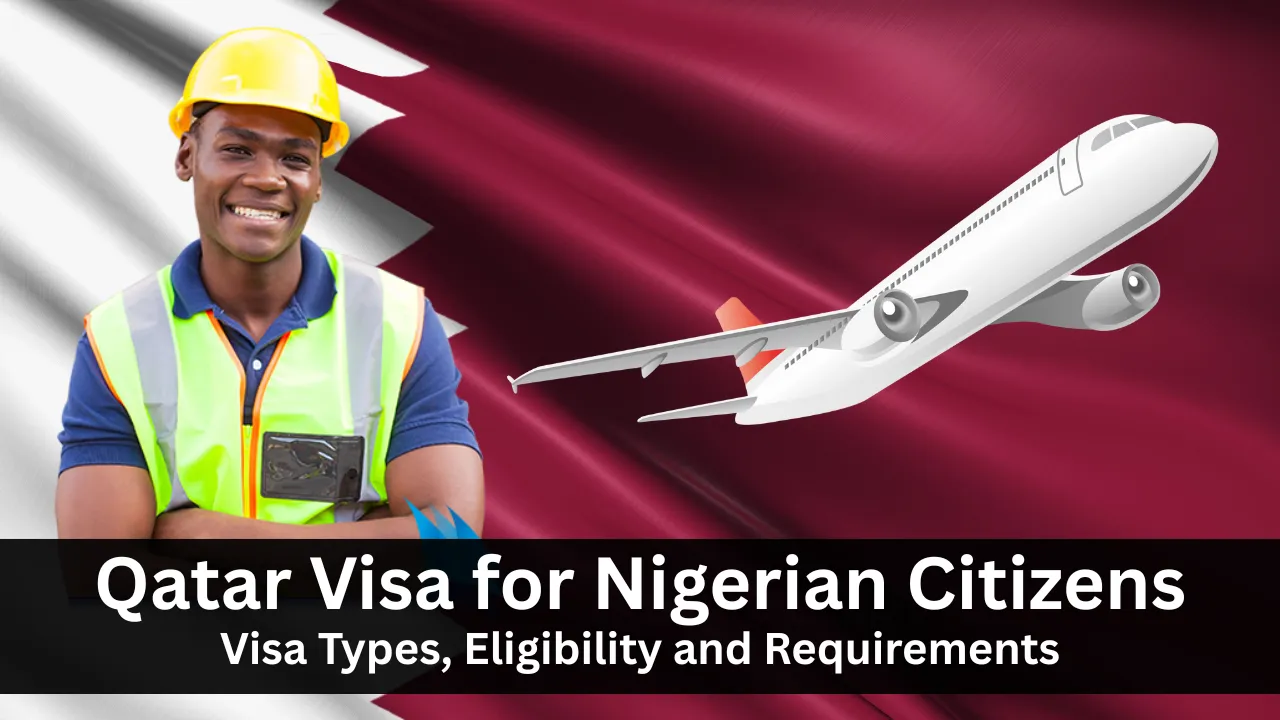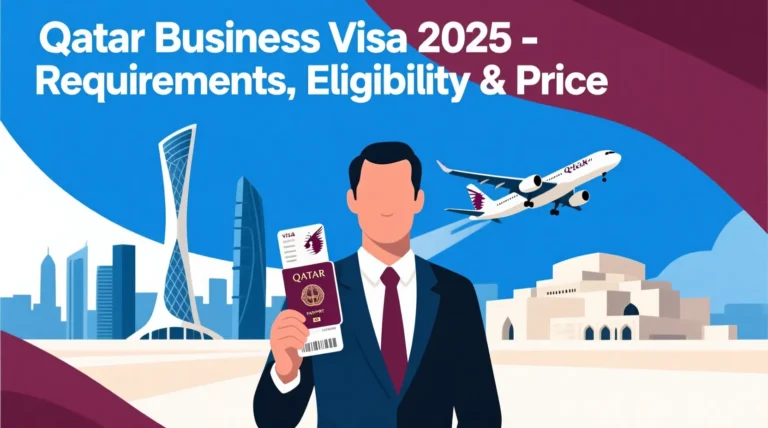Many Nigerian travellers face delays, Qatar Visa Rejection, or confusion when applying for a Qatar visa. Missing one document can cost you weeks, and choosing the wrong visa type can lead to entry refusal at Hamad International Airport. The rules keep changing, and official updates are often hard to understand. This guide will clear every doubt from picking the right visa type to avoiding the mistakes that stop many from entering Qatar.
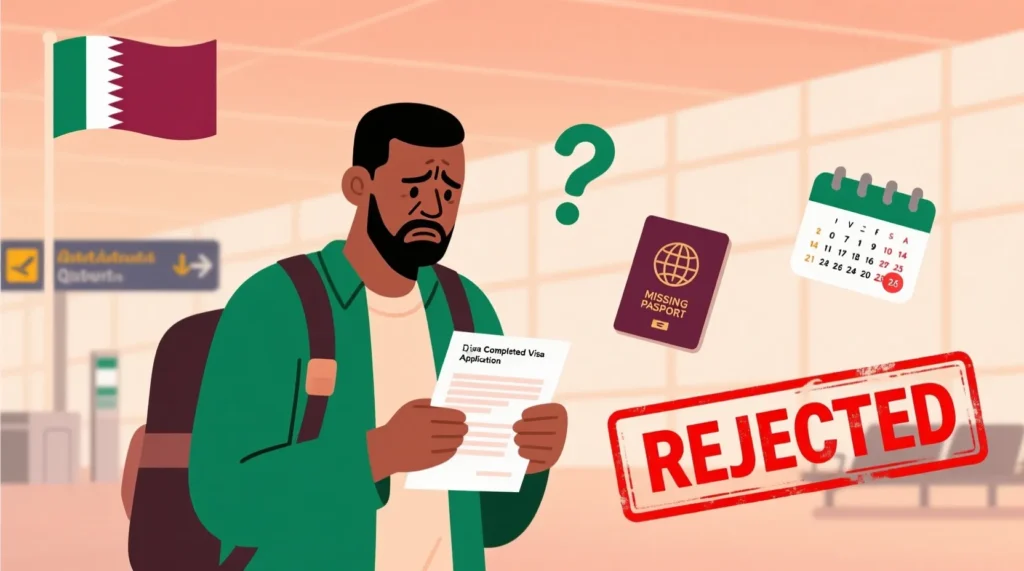
Whether you plan to explore Doha’s museums, work in Qatar’s booming gas industry, or visit family, understanding the visa process is your first step. Each visa type has its own rules, fees, and required documents. The process is simpler when you know exactly what immigration officers expect from Nigerian applicants. In the next sections, you’ll learn about the available visa options, the official requirements, and how to submit your application without errors.
Qatar: An Emerging Spot for Nigerian Travellers
Qatar has quickly transformed from a quiet Gulf nation into a global travel hub. Nigerians are choosing it for more than just tourism, many arrive for business opportunities, higher education, or short-term work contracts.
Doha’s modern skyline, the FIFA World Cup legacy stadiums, and traditional markets like Souq Waqif create a mix of culture and modern comfort. With direct flights from Lagos and Abuja, plus a growing Nigerian community in Qatar, the country feels more welcoming than ever. But before booking your ticket, you need to understand the visa rules that decide how long you can stay and what you can do.
Do Nigerians Need a Visa to Enter Qatar?
Yes, Nigerian passport holders need a visa before traveling to Qatar. There is no visa-free entry or visa-on-arrival for Nigerians. The type of visa you need depends on your purpose of travel, tourism, work, study, or visiting family. All applications must be approved before departure, either through the official Qatar eVisa system or the Qatari embassy. Immigration officers at Hamad International Airport will check your entry permit along with your return ticket and proof of accommodation. Skipping this step can lead to denied boarding or refusal at the port of entry.
Types of Qatar Visas Available for Nigerian Citizens
Qatar’s visa system is designed to match different travel needs. The right visa will decide how long you can stay, what activities you can do, and whether you can work or study. Choosing the wrong type can lead to application rejection or problems at the border. Below are the main visa categories available for Nigerian passport holders.
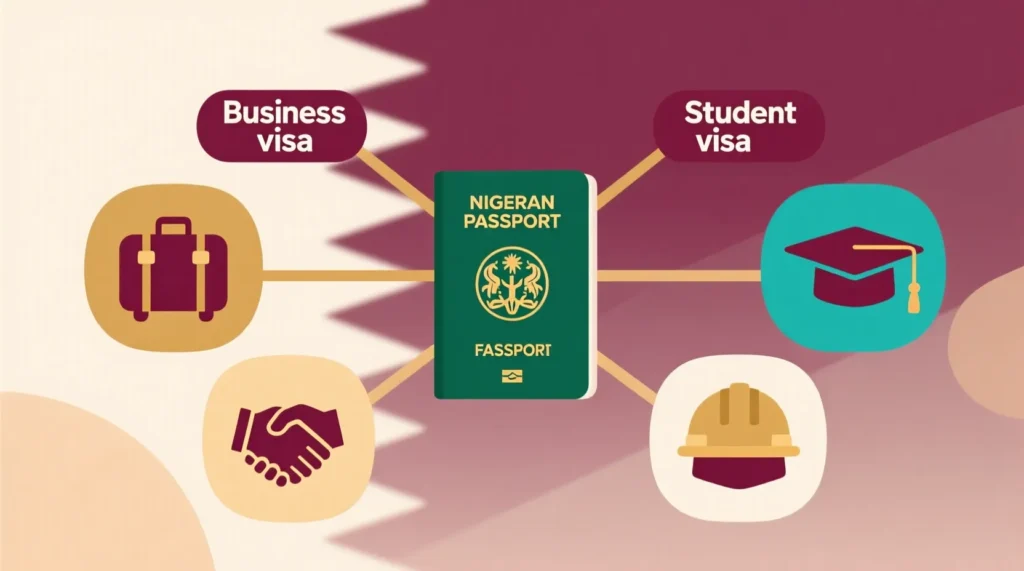
Tourist Visa / Tourist e-Visa
Ideal for Nigerians visiting Qatar for leisure, family holidays, or cultural experiences. Commonly valid for 30 days with the option to extend for another month. You can apply through the official Qatar eVisa portal without visiting the embassy. Immigration officers may also ask for a return ticket, hotel booking, or proof of funds. This visa does not allow employment.
Business Visa
For Nigerians traveling to attend meetings, exhibitions, training programs, or corporate events in Doha. An invitation letter from a Qatari-registered company or event organizer is usually required. Validity ranges from a few weeks to 3 months, depending on the purpose. While on a business visa, you can attend professional activities but cannot take up paid employment in Qatar.
Transit Visa
Offered to passengers with long layovers at Hamad International Airport, typically between 5 and 96 hours. This visa is free if booked through Qatar Airways and is perfect for short city visits between flights. A confirmed onward ticket and valid passport are mandatory.
Student Visa
Issued to Nigerians who have secured admission to Qatari institutions like Qatar University, Hamad Bin Khalifa University, or Education City partner universities. Requires an official acceptance letter, proof of tuition fee payment, and sometimes a sponsor in Qatar. The visa is valid for the duration of the study program and can be renewed annually.
Family Visit Visa
Allows Nigerian residents in Qatar to sponsor close relatives such as spouses, children, or parents. Proof of relationship (like marriage or birth certificates) must be submitted. This visa usually allows a stay of 1 to 6 months, depending on the relationship category. In some cases, it can be converted to a residence permit.
Work Visa (Residence Permit)
Granted to Nigerians hired by Qatari employers. The process involves securing a job offer, undergoing medical tests, and providing a police clearance certificate. The sponsoring employer handles most of the application process through Qatar’s Ministry of Interior. The visa allows long-term residence and can be renewed based on the employment contract.
The Qatar Electronic Visa (eVisa)
The Qatar eVisa is an online travel permit that allows Nigerian citizens to enter the country without visiting an embassy. It is designed for short-term visits, mainly for tourism, family visits, or business meetings. The entire process from application to approval is handled digitally, making it faster and more convenient than traditional paper-based applications.
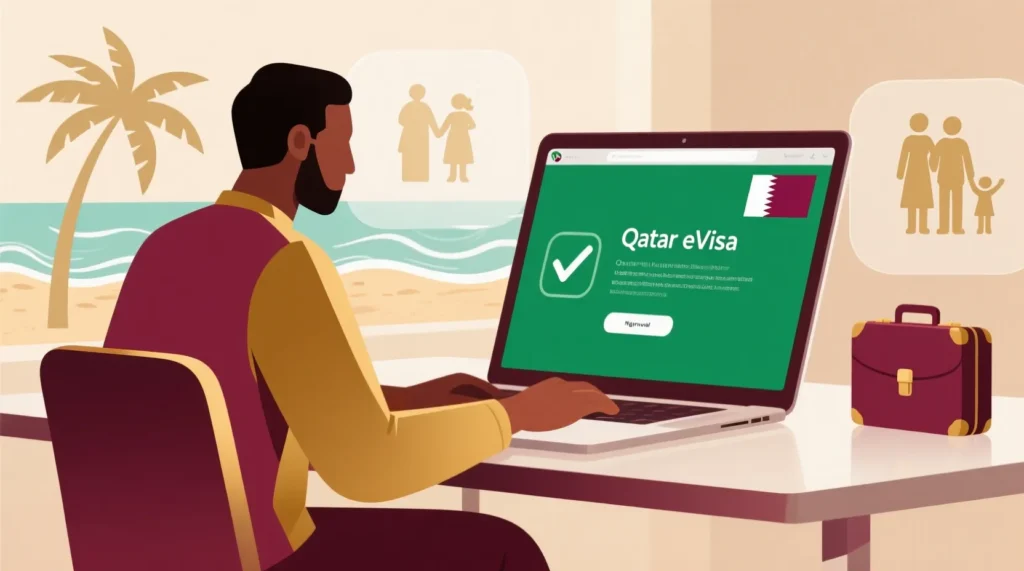
Key Features
- 100% Online Process – Apply, pay, and receive your visa without visiting a consulate.
- Short Processing Time – Many approvals are issued within 3 to 5 business days.
- Multiple Entry Options – Some eVisas allow single or multiple entries depending on the application type.
- PDF Issuance – Approved visas are sent via email and can be printed for travel.
Who Is Eligible?
Nigerian citizens planning short-term travel to Qatar for tourism, family visits, or business can apply for an eVisa if they meet these conditions:
- Valid Nigerian passport with at least 6 months validity
- Return flight ticket or onward travel proof
- Hotel booking or local host address in Qatar
- Proof of sufficient funds for the stay
Difference Between eVisa and Other Visa Types
Unlike work, student, or residence visas, the eVisa is meant for temporary stays and does not allow employment or long-term residence. It is processed faster but has stricter limitations on stay duration and permissible activities.
Required Documents for a Qatar Visa Application
Submitting the right documents is the key to getting your Qatar visa approved. Many Nigerian applications face delays or rejection simply because one paper is missing or incorrect. The exact requirements depend on the visa type, but most applications need the following:
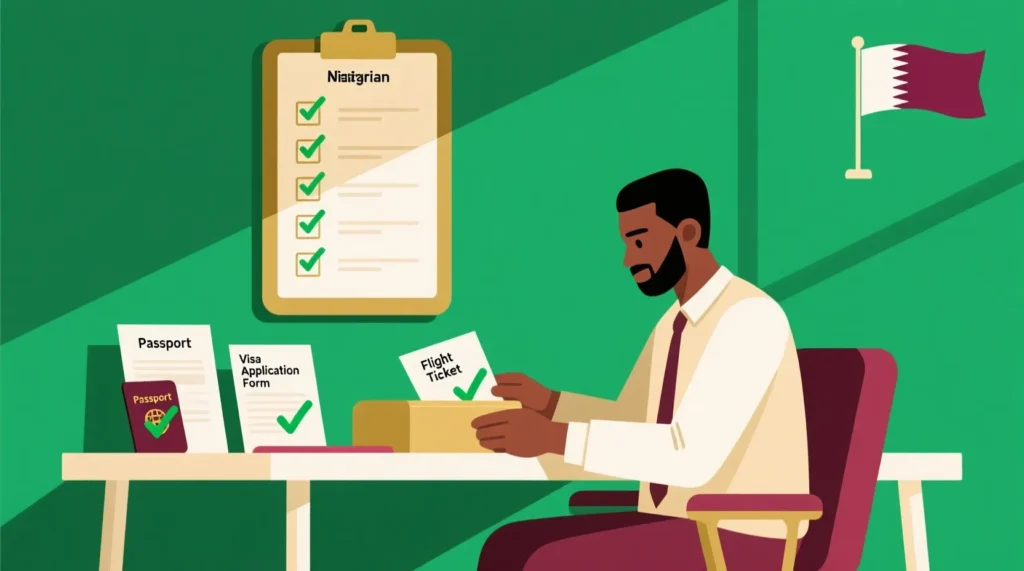
Basic Requirements
- Valid Nigerian Passport – Must be valid for at least 6 months from the date of entry into Qatar.
- Passport-Sized Photographs – Clear, recent, and taken against a white background.
- Completed Visa Application Form – Filled accurately with no spelling or factual errors.
- Return or Onward Flight Ticket – Proof that you will leave Qatar before your visa expires.
- Hotel Booking or Host Address – A confirmed accommodation reservation or invitation from a Qatari resident.
- Proof of Funds – Bank statements or payslips showing you can cover your stay expenses.
Additional Documents (If Applicable)
- Invitation Letter – For business or family visit visas, signed by the host or sponsoring company.
- Employment Contract – For work visas, issued by the Qatari employer and attested if required.
- University Admission Letter – For student visas, from a recognized Qatari institution.
- Police Clearance Certificate – Sometimes needed for work or long-term residence applications.
- Medical Test Results – Required for certain long-term visa categories before final approval.
Pro Tip: Always scan and save digital copies of your documents before submitting your application. This helps in case an embassy or immigration office requests resubmission.
How to Apply for a Qatar Visa as a Nigerian Citizen
Applying for a Qatar visa is simple when you follow the correct steps. The process can be completed online through the Qatar eVisa portal or offline via the Qatari embassy. Here’s a clear breakdown:
Step 1: Choose the Right Visa Type
Decide whether you need a tourist, business, transit, student, family visit, or work visa. Your choice should match your purpose of travel.
Step 2: Gather Required Documents
Collect all basic and additional documents relevant to your visa type, including passport, photos, accommodation details, and proof of funds.
Step 3: Apply Online or Through the Embassy
- Online: Visit the official Qatar eVisa portal, create an account, and complete the application form.
- Embassy: Submit your application at the Qatari embassy or consulate in Nigeria with the required papers.
Step 4: Pay the Visa Fee
Payment is usually made online for eVisa applications or at the embassy counter for paper submissions. Keep the receipt for reference.
Step 5: Submit Application & Receive Confirmation
Once submitted, you will get a confirmation email or slip with your application number.
Step 6: Track Your Application
Use your reference number to check the status online. Processing times vary depending on visa type and season.
Step 7: Receive & Print Your Visa
When approved, your eVisa will be emailed as a PDF. Print at least two copies, one for travel and one as a backup.
Validity, Processing Time, and Stay Period
The validity of a Qatar visa determines how long you can enter the country before it expires, while the stay period defines how long you can remain in Qatar once you arrive. Both vary based on the visa category you choose.
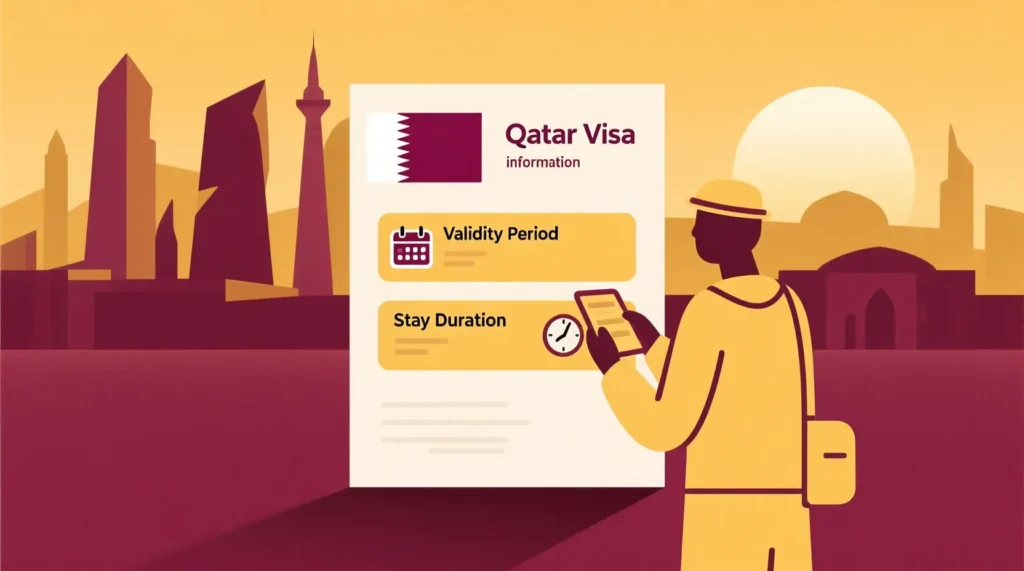
Validity Period
- Tourist Visa / eVisa: Usually valid for 90 days from the date of issue. You must enter Qatar before it expires.
- Business Visa: Often valid for 1–3 months, depending on the invitation letter.
- Work Visa (Residence Permit): Valid for 1–3 years, aligned with your employment contract.
- Family Visit Visa: Valid for 1–6 months based on relationship type and sponsor status.
Processing Time
- eVisa: 3–5 business days in most cases, but during peak seasons (e.g., major events or holidays), it may take up to 10 days.
- Embassy-Processed Visa: 5–15 working days depending on document verification.
- Work & Student Visas: 2–4 weeks due to additional security and medical checks.
Stay Period
- Tourist Visa: Up to 30 days, extendable for another 30 days.
- Business Visa: Usually 30–90 days, non-extendable.
- Work Visa: Allows long-term stay until the end of the employment contract.
- Transit Visa: 5–96 hours maximum, no extension allowed.
Visa Extension Options for Nigerians
Extending your stay in Qatar is possible for certain visa categories, but it must be done before your current visa expires. Overstaying without renewal can lead to fines, travel bans, or future visa rejections.
Tourist Visa / eVisa Extension
- Most tourist visas allow a one-time extension of up to 30 days.
- You can apply online through the Qatar Ministry of Interior (MOI) website or visit an MOI service center in Doha.
- You must have a valid passport, proof of accommodation, and sufficient funds for the extended stay.
Family Visit Visa Extension
- Can be extended for up to six months if the visitor is an immediate family member.
- Proof of relationship and sponsor’s valid Qatari ID are required.
- Extensions are granted at MOI offices after medical check-ups for longer stays.
Work Visa / Residence Permit Renewal
- Work visas are typically renewed by the employer.
- Renewal should be started at least one month before expiry to avoid work disruptions.
- Requires a renewed employment contract, updated medical test results, and valid insurance.
Transit Visa Extension
- Transit visas cannot be extended beyond the 96-hour limit. Travelers must leave Qatar and reapply if needed.
Consequences of Overstaying in Qatar
Overstaying in Qatar might seem harmless if it’s “just a few extra days,” but in reality, it can quickly turn into a costly legal headache. Qatar’s immigration laws are strict, and the government uses advanced tracking systems to monitor visa expiry dates. The longer you overstay, the more serious the consequences become, financially, legally, and even for future travel.
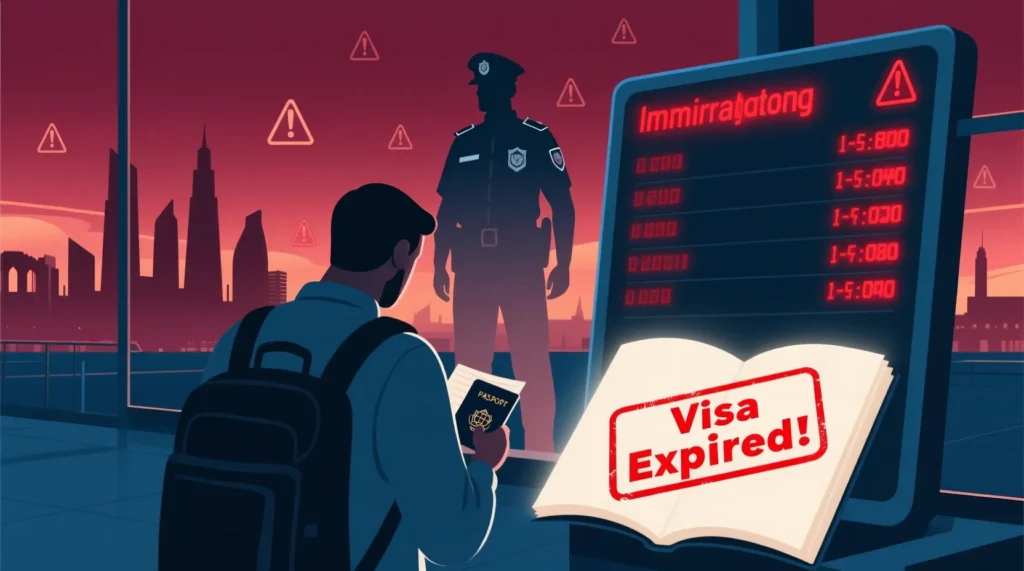
1. Daily Overstay Fines
If you remain in Qatar after your visa expires, you’ll be charged a daily penalty.
- Standard fine: Generally QAR 200 per day for most visit visas (amount can vary).
- These fines add up fast, so even a week’s delay could cost you more than your original trip expenses.
2. Difficulty in Leaving the Country
Airports in Qatar are connected to the immigration database. If your visa is expired, your exit process will be blocked until fines are cleared.
- You may be sent to a separate immigration counter.
- You might face interrogation about the reason for overstaying.
This can be extremely stressful, especially if your flight is in a few hours.
3. Possible Deportation
If the overstay is significant (weeks or months), you could be detained and deported.
- Deportation means you’ll be sent back to your home country at your own expense.
- Your name could be added to Qatar’s immigration blacklist.
4. Ban on Re-Entry
For serious cases, Qatar may impose a travel ban for a specific period (often 1–5 years).
- This can ruin future plans for work, transit, or even visiting family in Qatar.
5. Legal Proceedings
If your overstay is linked to work visa violations or criminal cases, the matter can escalate to court.
- This may involve detention until your case is resolved.
- Legal costs and translation services can make it even more expensive.
6. Impact on Other GCC Countries
GCC (Gulf Cooperation Council) countries often share immigration data. Overstaying in Qatar could affect your chances of getting visas for UAE, Saudi Arabia, Oman, Kuwait, and Bahrain in the future.
Common Reasons for Qatar Visa Rejection
When I was in Saudi Arabia, I met a Nigerian man at a small roadside café. Over tea, he told me how excited he had been about his new job offer in Qatar. He had packed his bags, said goodbye to his family, and applied for his visa, only to face a rejection email a few days later. His mistake? A simple documentation error that could have been avoided.
Visa rejections can be disheartening, especially when you’ve made big plans. In Qatar, even a small oversight can be enough to derail your application. Here are some of the most common reasons visas get rejected:
- Incomplete or Incorrect Documents – Missing a passport copy, outdated photos, or incorrect application forms can lead to instant rejection.
- Previous Immigration Violations – Overstaying in another country or breaking local laws can raise red flags.
- Security Concerns – If your name matches someone on a security watchlist, your application might get delayed or denied.
- Mismatched Information – Differences between your passport details, job offer, or employer documents can trigger suspicion.
- Unpaid Fines or Legal Cases in Qatar – If you’ve been in Qatar before and left with unpaid fines or unresolved legal issues, you’ll likely face rejection.
A little extra care during the application process could have saved that Nigerian man weeks of frustration. Always double-check documents, confirm details with your sponsor, and ensure there’s no loose end in your record before applying.
Tips for a Successful Qatar Visa Application
From my own travel experiences and the stories I’ve heard from fellow travelers, I can confidently say your Qatar visa application can either be a smooth ride or a frustrating loop of rejections and delays. The difference lies in how well you prepare. Here are some practical tips that can save you from headaches:
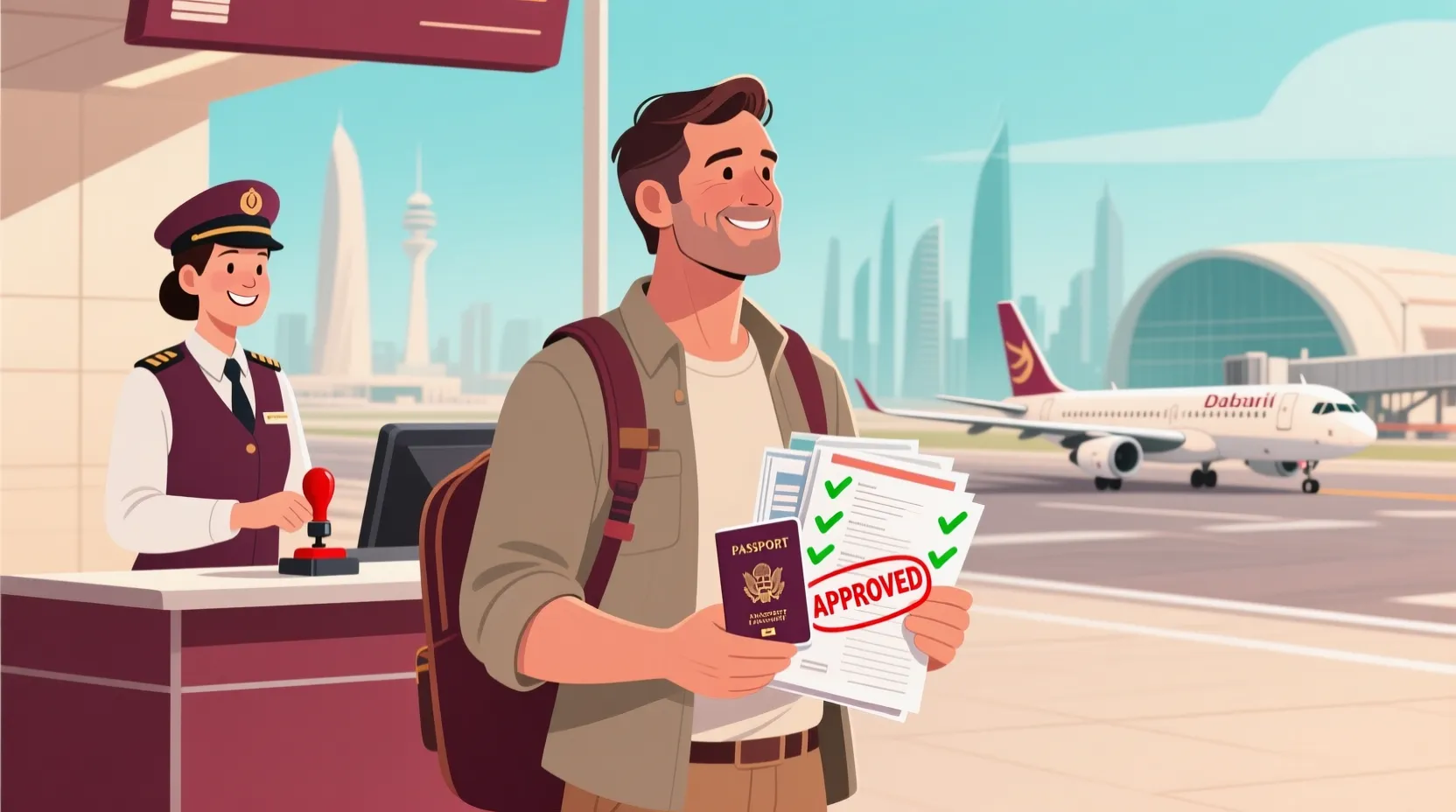
- Double-Check All Documents
Even a small typo in your passport number or mismatched names between documents can lead to rejection. I once met a Pakistani traveler in Riyadh who had his application rejected simply because his name on the visa form missed one letter compared to his passport. - Apply Through Official Channels
Always use the official Qatar government portal or a trusted, authorized travel agency. Third-party or shady agents may overcharge you or submit incomplete applications. - Meet the Financial Requirements
If Qatar requires proof of funds, ensure your bank statement clearly shows the required balance for the specified period. I’ve seen people denied because they submitted a last-minute deposit, which looked suspicious to immigration officers. - Follow the Photo Guidelines
Qatar’s system is strict about passport-size photos wrong background color or wearing headgear without religious reason can get your application rejected. - Apply Early
Don’t wait until the last minute. Processing delays are common, and applying early gives you time to fix any issues before your planned travel date. - Be Honest on Your Application
Any false information, even if you think it’s harmless, can result in a ban. Immigration records are interconnected across GCC countries, so lying is a risk you can’t afford.
Conclusion
Applying for a Qatar visa might seem straightforward, but one small mistake can turn the whole process into a headache. From incomplete documents to overstaying in other countries, even minor errors can lead to rejection. The key is to prepare in advance double-check your paperwork, follow the official requirements, and always keep your travel history clean.
Think of your visa application like an important job interview: you get one chance to make the right impression. If you approach it with attention to detail and honesty, you not only increase your approval chances but also ensure a smooth, stress-free journey to Qatar. And remember prevention is always easier than dealing with the consequences of rejection later.

